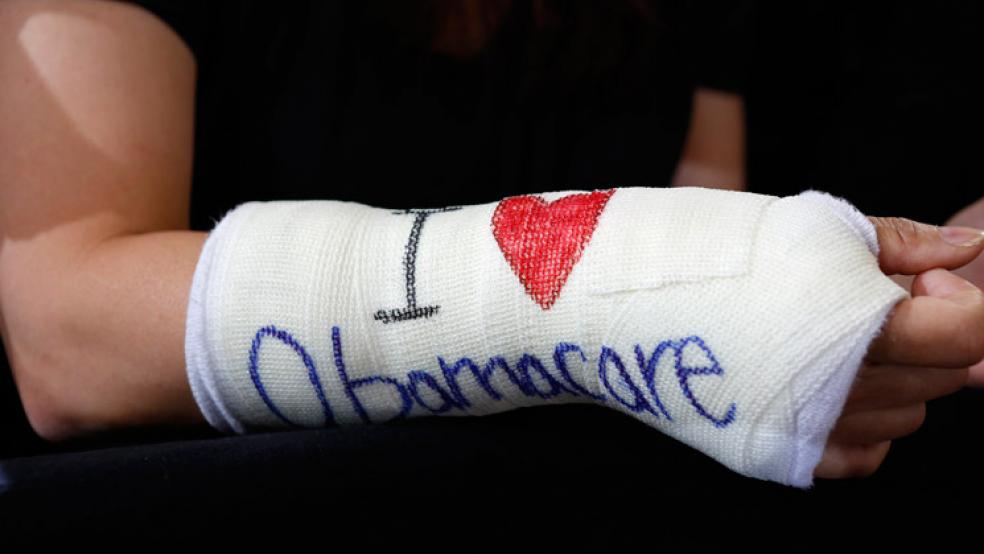The last time Obamacare faced the Supreme Court, it was Chief Justice John Roberts who made the deciding vote to save the health care law. This time Obamacare’s savior may actually be a man who tried to kill it three years ago and his reason may have nothing to do with health care.
During oral arguments in King v. Burwell on Wednesday, Justice Anthony Kennedy potentially tipped his hat in the administration’s favor when he voiced serious concerns over how a ruling in favor of the plaintiff could possibly violate states’ rights.
Related: How Obamacare Rates with Consumers One Year Later
Though Kennedy seemed to agree with the plaintiff’s argument, he appeared to be more concerned with the implications it could have on the states and their constitutional rights—setting him up as the likely swing vote in the high-stakes case that will have major implications for millions of people getting coverage through the health care law.
The whole case centers on language in the Affordable Care Act that says people can qualify for federal subsidies if they buy insurance on an exchange “established by the state.”
The plaintiffs charge that since the law doesn’t explicitly mention the federal exchange, it intentionally excludes subsidies for people living in the 34 states that chose not to set up an exchange. The Obama administration, meanwhile, maintains that the language doesn’t exclude anyone and that the provision should be read in the larger context of the law.
Kennedy signaled that he agrees with the plaintiff’s reading of the law and that the language only provides subsidies to people in states that set up their own exchanges.
Related: Obamacare Arguments Leave More Questions Than Answers
However, the problem for him comes down to what happens when these states lose their subsidies. Kennedy, who was appointed by President Ronald Reagan, is a strong supporter of states’ rights who has on numerous occasions voted to limit the reach of the federal government to preserve state power.
For months, the administration has warned that if the Court strips federal exchange states of their subsidies, at least 8 million people will lose their health care subsidies and millions could leave the insurance risk pools, forcing premiums to rise. Meanwhile, states that chose to create their own exchanges will essentially be unaffected.
That sets up a “serious constitutional problem” Kennedy said. Since it pressures states to set up exchanges and punishes the ones that don’t.
“Let me say that from the dynamics of Federalism, it does seem to me that there is something very powerful to the point that…the states are being told either create your own exchange, or we’ll send your insurance market into a death spiral. We’ll have people pay mandated taxes which [they] will not get any credit on—on the subsidies. The cost of insurance will be sky-high, but this is not coercion. It seems to me that under your argument, perhaps you will prevail in the plain words of the statute, [but] there’s a serious constitutional problem if we adopt your argument,” Kennedy said to the plaintiff’s attorney, Michael Carvin.
He compared it to a hypothetical situation in which the federal government could withhold highway funding for states that didn’t reduce their speed limit to 35 miles per hour. “We wouldn’t allow that.” He said.
Related: Obamacare Goes to Court as Uninsured Rate Drops
This wasn’t the first time that the case has devolved into an argument about federalism. Yale Law professor Abbe Gluck, an Obamacare advocate, co-authored an amicus brief filed before the Court in November arguing that the plaintiff’s interpretation of the law would “result in a significant intrusion on the usual balance between the state and federal governments.” She also wrote ann op-ed supporting that point in Politico last week.
Though it’s impossible to know what will actually happen, Kennedy’s points suggest he could rule against the government pertaining to the law’s language, but also uphold the federal subsidies on the basis that striking them down would be unconstitutional.
However, others deny that Kennedy will ultimately rule with the administration—saying that the federalist argument doesn’t hold water in this case because states would be able to fully function without the subsidies.
The Manhattan Institute’s Avik Roy argued in Forbes that if the Court sided with the plaintiff it wouldn’t set up utter chaos and disruption that the administration has described.
“First of all, the argument that havoc and destruction will ensue if subsidies go away is simply factually wrong. There will remain an individual mandate, forcing many people to purchase health coverage regardless of their eligibility for subsidies,” Avik wrote. He continued…“It’s true that in a subsidy-free state, average premiums would likely go up, and that fewer people would enroll in Obamacare than originally hoped. But guess what? That has already happened, even with federal exchange subsidies.”
Related: This New Poll Shows Why Obamacare Court Ruling Could Be Devastating
Of course, that claim stands in stark contrast to numerous studies that conclude an adverse ruling will result in a disastrous situation for millions of people, their medical providers and the insurance market.
For now the justices appear closely divided. During oral arguments, the liberal wing -Justices Elena Kagan, Sonia Sotomayor, Ruth Bader Ginsburg and Stephen Breyer voiced their support for the administration, while the conservative side of the bench including Justices Antonin Scalia, Samuel Alito and Clarence Thomas support the challenger. Meanwhile, Chief Justice John Roberts was tightlipped, leaving only Kennedy to provide a clue as to how the Court might rule. Until June it’s only a guessing game.
Top Reads From the Fiscal Times:


